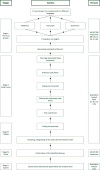Trained facilitators' experiences with structured advance care planning conversations in oncology: an international focus group study within the ACTION trial
- PMID: 31672145
- PMCID: PMC6822448
- DOI: 10.1186/s12885-019-6170-7
Trained facilitators' experiences with structured advance care planning conversations in oncology: an international focus group study within the ACTION trial
Abstract
Background: In oncology, Health Care Professionals often experience conducting Advance Care Planning (ACP) conversations as difficult and are hesitant to start them. A structured approach could help to overcome this. In the ACTION trial, a Phase III multi-center cluster-randomized clinical trial in six European countries (Belgium, Denmark, Italy, the Netherlands, Slovenia, United Kingdom), patients with advanced lung or colorectal cancer are invited to have one or two structured ACP conversations with a trained facilitator. It is unclear how trained facilitators experience conducting structured ACP conversations. This study aims to understand how facilitators experience delivering the ACTION Respecting Choices (RC) ACP conversation.
Methods: A qualitative study involving focus groups with RC facilitators. Focus group interviews were recorded, transcribed, anonymized, translated into English, and thematically analysed, supported by NVivo 11. The international research team was involved in data analysis from initial coding and discussion towards final themes.
Results: Seven focus groups were conducted, involving 28 of in total 39 trained facilitators, with different professional backgrounds from all participating countries. Alongside some cultural differences, six themes were identified. These reflect that most facilitators welcomed the opportunity to participate in the ACTION trial, seeing it as a means of learning new skills in an important area. The RC script was seen as supportive to ask questions, including those perceived as difficult to ask, but was also experienced as a barrier to a spontaneous conversation. Facilitators noticed that most patients were positive about their ACTION RC ACP conversation, which had prompted them to become aware of their wishes and to share these with others. The facilitators observed that it took patients substantial effort to have these conversations. In response, facilitators took responsibility for enabling patients to experience a conversation from which they could benefit. Facilitators emphasized the need for training, support and advanced communication skills to be able to work with the script.
Conclusions: Facilitators experienced benefits and challenges in conducting scripted ACP conversations. They mentioned the importance of being skilled and experienced in carrying out ACP conversations in order to be able to explore the patients' preferences while staying attuned to patients' needs.
Trial registration: International Standard Randomised Controlled Trial Number registry 63110516 ( ISRCTN63110516 ) per 10/3/2014.
Keywords: Advance care planning; Cancer; Experiences; Facilitator; Respecting choices.
Conflict of interest statement
The authors declare that they have no competing interests.
References
Publication types
MeSH terms
Grants and funding
LinkOut - more resources
Full Text Sources


